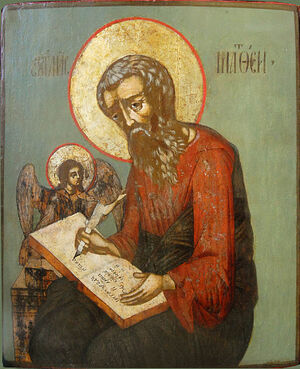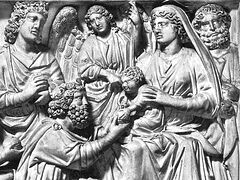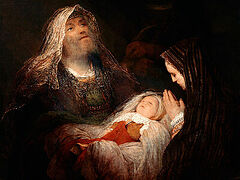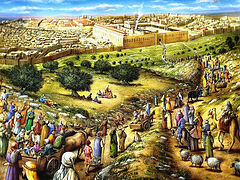 Photo: hranitelclub.com We conclude our series examining St. Matthew’s citations of the Old Testament. Today we look at his citation of Isaiah 40:3, which reads, “A voice cries, ‘In the wilderness prepare the way of Yahweh! Make straight in the desert a highway for our God!”
Photo: hranitelclub.com We conclude our series examining St. Matthew’s citations of the Old Testament. Today we look at his citation of Isaiah 40:3, which reads, “A voice cries, ‘In the wilderness prepare the way of Yahweh! Make straight in the desert a highway for our God!”
In its original context the oracle referred to the return of Yahweh to Zion after the exile. He was coming from Sinai through the wilderness to rescue His people. Just as roads were repaired in preparation for a king to travel on them, so the prophet bids the highways through the desert be made straight for Yahweh. (The interpretation that sees in this Yahweh leading His people back from Babylon to Palestine is less likely, since that route did not lead through a wilderness or desert.) Yahweh had abandoned His people to their sins so that they languished in exile. Now their long captivity was over, and Yahweh was coming to bring them home and restore His glory in their midst.
As mentioned before, the long exile was not truly over until the promised glory was restored by the Messiah. It made sense therefore to see in this oracle a prediction of our Lord’s immediate Forerunner, John the Baptizer. He was the voice mentioned by the oracle. As the prophetic voice in Isaiah’s oracle stood in the wilderness of Sinai crying out for that wilderness to be prepared, so John stood in the wilderness of Judea crying out for the final preparation.
The mention of Sinai here is more theological than geographical. Sinai was the home of Yahweh, which is why Elijah journeyed there to find Him in his moment of crisis (1 Kings 19:8f). In Habakkuk’s theophany, Yahweh comes in triumph from the Sinai desert and His splendour covered the heavens (Habakkuk 3:3f). In the same way, in this prophecy of Isaiah Yahweh comes from Sinai in triumph to His people, bringing judgment and restoration. The Sinai reference emphasizes that it is God Himself who comes to the rescue.
Isaiah predicted it; John the Baptizer saw it fulfilled in Jesus. Jesus was the true Lord and God, coming to His people to judge and restore. He would thoroughly clean His threshing floor, giving sentence upon all men, separating the wheat from the chaff. The wheat would be gathered into the barn of new heaven and the new earth, while the chaff would removed and burned with unquenchable fire (Matthew 3:12).
Once again, Matthew reads all the prophecies predicting Messianic salvation through the lens of Christ’s coming. Because that long-promised salvation only came through Him, all the verses and circumstances surrounding it find their fulfillment in Him.
The final citation in this Christmas and Theophany series is from Isaiah 9:1-2. It reads, “There will be no gloom for her that was in anguish. In the former time he brought into contempt the land of Zebulun and the land of Naphtali, but in the latter time he will make glorious the way of the sea, the land beyond the Jordan, Galilee of the nations. The people who walked in darkness have seen a great light; those who dwelt in a land of deep darkness, on them has light shined.”
One wonders in reading the text what was so gloomy and dark about the land belonging to the tribes of Zebulun and Naphtali? The answer lies in the original historical context. The tribes of Zebulun and Naphtali inhabited the far north of the country, right at the border. And it was from the north that all foreign invasions occurred (compare Jeremiah 1:13f). Those tribes therefore were the first to experience the horrors of war, the rape, pillage, and destruction of the invaders. They cowered in the darkness of fear, hardly daring to look north for fear of what they might see in those terrible days.
Isaiah, however, looked forward to a time of peace. In those happy days, Galilee of the nations would no longer have to cower in fear of invasion. The land would rest secure under the Messiah, and light would finally shine on those who before had to walk in darkness. The oracle was clearly Messianic, for it would go on the describe the birth of a child, a son given to Israel, whose name (in the Masoretic text; it is lacking in the LXX) would be “Wonderful counselor, mighty God, eternal father, prince of peace” (Isaiah 9:7).
Since Jesus was that mighty God and prince of peace, the prophecy is fulfilled in Him. But this fulfillment is re-interpreted, even as the Kingdom He brought was not a political kingdom but a spiritual one. The darkness from which Christ saves us is not the darkness of fearful invasion, with enemies crossing a border to lay waste. Jesus saves us from the deeper darkness of sin and death, so that we need not fear our spiritual and bodiless foes, the demons.
The Evangelist once again focuses upon the details of the prophetic text. Just as Isaiah declared that the northern regions of Galilee, the possession of the tribes of Zebulun and Naphtali, would be illumined by God’s salvation, so that same region was illumined by the light of Christ when He settled there.
Given that the eventual center of His Church was to be in Jerusalem, one might have guessed that He would make Jerusalem His center of operation, but He did not. The small town of Capernaum, tucked away in distant Galilee, was His earthly headquarters. Paging through the prophecies of Isaiah, Matthew discovered the reason: it had to be so! God had to make glorious the land beyond the Jordan, Galilee of the nations. It was on them that Christ’s great light had first to shine.
St. Matthew’s use of the Old Testament was that of the apostles generally, in that it regarded Jesus as the ultimate fulfillment of all the Scriptures about Messianic judgment and restoration. In true Jewish fashion, Matthew knew that the Scriptures, being ultimately the work of God’s Spirit, contained deep meanings and had many layers, including those not immediately obvious to a casual historical reading. Those deeper meanings referred to Christ, since He is the embodiment of all Israel’s sacred history. He is the recapitulation of Israel’s story; as Israel’s true king, He represents His people. In Him are hidden all the treasures of wisdom and knowledge (Colossians 2:3), so that He is the true focus of all the Old Testament.



